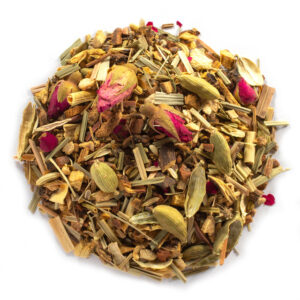Caffeine Levels:
Not all Ayurvedic teas are caffeine-free.
While many traditional Ayurvedic formulations may be caffeine-free or have minimal caffeine content, it ultimately depends on the specific ingredients used in the blend. Some Ayurvedic teas may contain caffeine-containing ingredients like green tea or black tea, which can provide a gentle energy boost.
Dietary Friendly:
Ayurvedic teas can be compatible with vegan, kosher, and paleo diets, but it depends on the specific ingredients used in each tea blend.
Health Benefits:
Ayurvedic teas are associated with various health benefits, often attributed to the specific herbs and spices used in Ayurvedic practices. Ayurvedic practices focuses on keeping one’s body and mind healthy.
-
Hush (Calming) Tea
$ 6.00 – $ 18.00 This product has multiple variants. The options may be chosen on the product page
Ayurvedic teas can be compatible with vegan, kosher, and paleo diets, but it depends on the specific ingredients used in each tea blend. Here are some considerations for each dietary preference:
Vegan-Friendly:
– Many Ayurvedic teas are plant-based and do not contain animal products. However, it’s crucial to check the entire ingredient list for any non-vegan components such as honey or certain flavorings.
Kosher-Friendly:
– For a tea to be considered kosher, it needs to adhere to specific guidelines regarding the sourcing and processing of ingredients. If a tea is labeled as kosher, it has likely met these standards. Look for kosher certification symbols on the packaging.
Paleo-Friendly:
– Paleo diets focus on whole, unprocessed foods. Ayurvedic teas that use natural herbs and ingredients may align well with paleo principles. However, you should verify that the specific tea blend adheres to paleo guidelines and does not contain additives or processed ingredients that may not be paleo-friendly.
Always read the product labels and ingredient lists on the tea packaging to ensure that it meets your specific dietary preferences and restrictions. If you have any doubts or concerns, contacting the tea manufacturer for clarification can provide additional information about the tea’s adherence to vegan, kosher, or paleo dietary practices.
Ayurvedic teas are associated with various health benefits, often attributed to the specific herbs and spices used in Ayurvedic practices. Here are three commonly reported health benefits:
Balancing Doshas:
– Ayurvedic teas are formulated to balance the three doshas—Vata, Pitta, and Kapha—according to Ayurvedic principles. Consuming Ayurvedic teas with herbs tailored to your dosha or for overall balance is believed to promote harmony within the body, supporting overall well-being.
Digestive Support:
– Many Ayurvedic teas include herbs like ginger, fennel, and peppermint, known for their digestive properties. These teas may help alleviate digestive discomfort, reduce bloating, and promote a healthy digestive system.
Stress Reduction and Relaxation:
– Ayurvedic herbs such as ashwagandha, holy basil (Tulsi), and Brahmi are commonly used to manage stress and promote relaxation. Ayurvedic teas with these ingredients may contribute to a sense of calmness, helping to alleviate stress and anxiety.
It’s important to note that while Ayurvedic practices have a long history, scientific research on the specific health benefits of Ayurvedic teas is ongoing, and individual responses can vary.
If you have specific health concerns or conditions, it’s advisable to consult with a healthcare professional before incorporating Ayurvedic teas into your routine.
